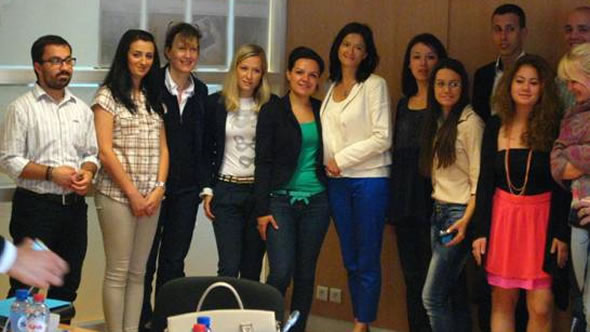Brussels – ESI briefs young leaders from Southeastern Europe

On 19 June 2012, ESI Senior Analyst Alexandra Stiglmayer briefed young leaders from eight countries in Southeastern Europe about the political situation in the Western Balkans and Turkey, regional cooperation and the enlargement process. The young people, who were close to Social-Democratic parties, had been invited to a four-day workshop in Brussels by the European Forum for Democracy and Solidarity and the Foundation for European Progressive Studies.
With regard to regional cooperation, Alexandra stressed that the problems very often involve countries that are already EU member states. She cited Greece's refusal to accept Macedonia's constitutional name as a result of which Greece is blocking the start of EU accession negotiations with Macedonia and its membership of NATO. She also mentioned the fact that Kosovo has not been recognised by five EU member states, which makes it impossible for the EU to conclude any agreements with Kosovo and carry out a stabilisation and association process with Kosovo like with the other Western Balkan countries.
Alexandra said that new efforts should be made to resolve the Macedonian name issue and presented a proposal by ESI Chairman Gerald Knaus. He suggested that Macedonia change its name in the constitution, but that the change enter into effect on the day on which Macedonia accedes to the EU. In this way, Greece would have an incentive to support Macedonia's accession process, while Macedonia would gain an ally and show that it is ready to compromise – and the compromise would be softened by the fact that it would become an EU member state on the day the amendment becomes effective.
With regard to Kosovo, Alexandra said it was important that the Commission be creative and find ways how it can bring the country into the European fold. She mentioned, as an example of achieving a goal that normally requires an agreement, Kosovo's law on readmission and bilateral readmission agreement with EU member states, which replace the EU-Kosovo readmission agreement. A functioning readmission agreement is a condition for a visa liberalisation process on which Kosovo was just embarking and which holds the potential to bring Kosovo much closer to the EU.
Alexandra said that the relations between Serbia and Kosovo are the most significant cooperation problem that involves only countries of the region. She criticised Serbia for not implementing the agreements reached so far under the Belgrade-Pristina Dialogue and said that all EU member states, even those that have not recognised Kosovo, expect a normalisation of relations between these two countries. She also said that Serbia has to be aware that it will be very difficult for it to join the Union if it refuses to cooperate with Kosovo. While it is true that five EU countries have not recognised Kosovo, 22 have – this is something that Serbia has to be aware of.
Finally, Alexandra also suggested that the countries of the region come together on issues of common concern and show a united front to Brussels. Sometimes this could be a joint op-ed by the prime ministers, but it could also be joint advocacy and lobbying efforts on important issues.
Alexandra briefly discussed the situation in each Western Balkan country, calling for the launch of accession negotiation with Montenegro. EU leaders are due to decide on this at the end of June. She said a positive decision would show that enlargement continues even in times of economic and financial difficulty, which would encourage the other candidate countries to continue to implement EU reforms.
Alexandra also talked about the accession negotiations with Turkey, which have almost ground to a halt. She said a visa liberalisation process for Turkey would be most important to revive EU-Turkey relations and show Turkey that it is not discriminated against.
Other speakers at the conference included MEP Tanja Fajon and Rene Cuperus, Director for International Relations and Senior Research Fellow at the Dutch Wiardi Beckman Foundation. The young leaders were from Albania, Bosnia, Croatia, Macedonia, Montenegro, Serbia, Slovenia and Turkey.
More information is available on ESI's enlargement portal, its Turkey pages and its pages on visa liberalisation with Turkey, Kosovo and the Western Balkans.
